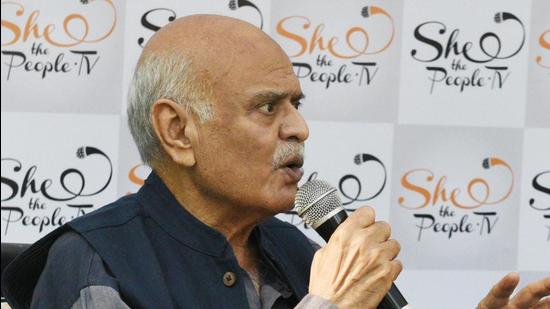Historian, queer rights activist Saleem Kidwai dies in Lucknow
Kidwai, born in 1951, is the author of Same-Sex Love in India: Readings from Literature and History (2001) which he co-authored with Ruth Vanita, a professor at the University of Montana
Noted historian and queer rights activist based in Lucknow Saleem Kidwai passed away Monday morning after suffering a heart attack. He had recently turned 70.

Kidwai, born in 1951, is the author of Same-Sex Love in India: Readings from Literature and History (2001) which he co-authored with Ruth Vanita, a professor at the University of Montana.
A copy of this book was given to the judges of the Constitution bench of the Supreme Court while it heard a clutch of petitions against Section 377, a colonial-era law that criminalised adult consensual same-sex relationships.
The law was read down in 2018 after a historic legal battle, which spanned over two decades in the Delhi high court, and later with different benches of the apex court.
Mario da Penha, a queer history scholar who co-founded the Jawaharlal Nehru University’s first queer students’ collective, Anjuman in 2003, said that the book came at a time when there was little representation of queer lives in literature.
“Same Sex Love in India spoke to the queer experience in India at a time when there were only a handful of books on the theme. It was the first attempt at tracing the long history of same-sex love in the subcontinent. It encompassed the academic, the activist and the literary world, and it did so with a seriousness and flair that was rare to find at the time. It was a testament to the years of research that both authors, Ruth Vanita and Saleem Kidwai, had put in,” he said.
Kidwai taught Indian medieval history at the University of Delhi’s Ramjas College and was associated with the gay rights movement helping establish support spaces for the Lesbian, Bisexual, Gay and Transgender (LGBT) community in the national capital.
In 1999, Chapal Mehra, a public health consultant and writer, created a queer space with Kidwai and a few others in New Delhi. Called Humraahi, it operated out of the office of the non-governmental organization Naz Foundation India Trust, which went on to file a petition against Section 377 in the Delhi high court a few years later. The group, said Mehra, benefitted greatly from Kidwai’s experience and soon started hosting films, discussions and even a helpline.
“There were talks, sharing circles, movie screenings, all of which are trendy today but weren’t used in that much capacity at the time. We held discussions on a range of issues, from safer sex practices to forced marriages and arrests by the police. A lot of the affirmative narratives we see in the media today trace their genesis to the work that groups like ours were doing at the time. Of course, at the time, we never thought we were doing anything extraordinary. We were just helping ourselves and others like us. But Saleem’s role was pivotal. He suggested what events we could do, and how we could manage things,” Mehra said.
Kidwai remained involved in queer activism even after the apex court overturned Section 377. He attended Pride events and marches in Lucknow, including one held earlier this year in March. He was a panellist and a mentor at the Awadh Queer Literature Festival which took place in Lucknow in 2019.
While his scholarship had a deep impact on the lives of queer people, Kidwai’s contribution to Urdu literature was equally immense, as he translated into English works of key Urdu writers and added to the scholarship on the lives of “singing ladies” and courtesans in Mughal India. Among his most significant translations are Malka Pukhraj’s autobiography, Song Sung True; most recently, he translated Qurratulain Hyder’s 1952 book, Safina-e-gham-e-dil, into English titled Ship of Sorrows.
“Saleem Kidwai’s work on LGBTQ lives is well known. His work emphasised the inclusive and plural customs of Indian history. He wrote on the courtesans of India and their musical and literary heritage. No work on Begum Akhtar is complete without his contribution. He is the only author to translate Qurratulain Hyder’s books apart from Hyder herself. As a historian, translator, activist and just the most wonderful person he will be missed. He was a gentleman of the old school, and they don’t make them anymore,” said Urdu scholar and author Rana Safvi.
Vanita, who teaches at the University of Montana, said that her dedication to Kidwai in a book, Gandhi’s Tiger and Sita’s Smile (2005) best encapsulated how she remembered him: “They have seemed to be together, though absent; shook hands, as over a void; and embraced, as it were from the ends of opposed winds.”
Kidwai was buried in his native village of Badagaon in Barabanki late Monday evening. He is survived by sisters Sufia, Uzra, and Hafsha, and nephews, Jamaal and Saif.
(With inputs from Dhrubo Jyoti)



